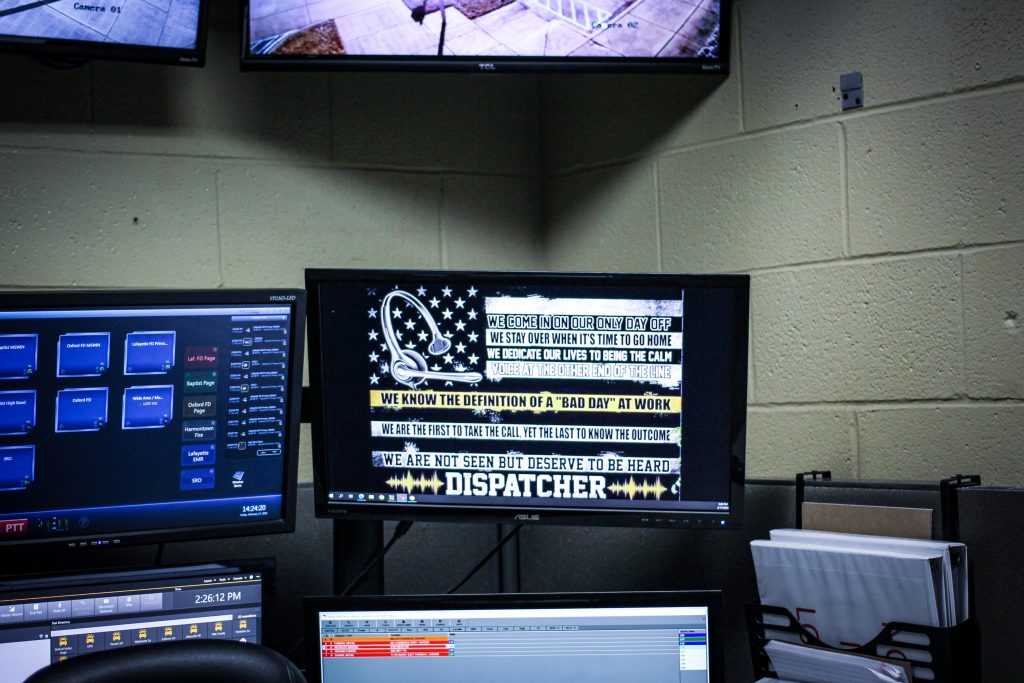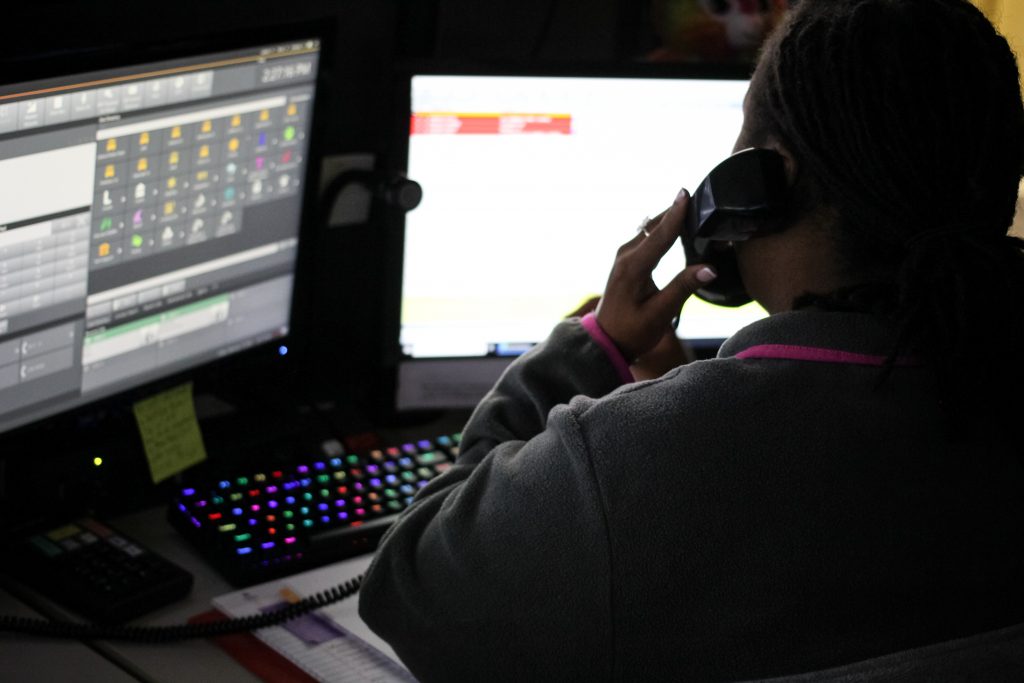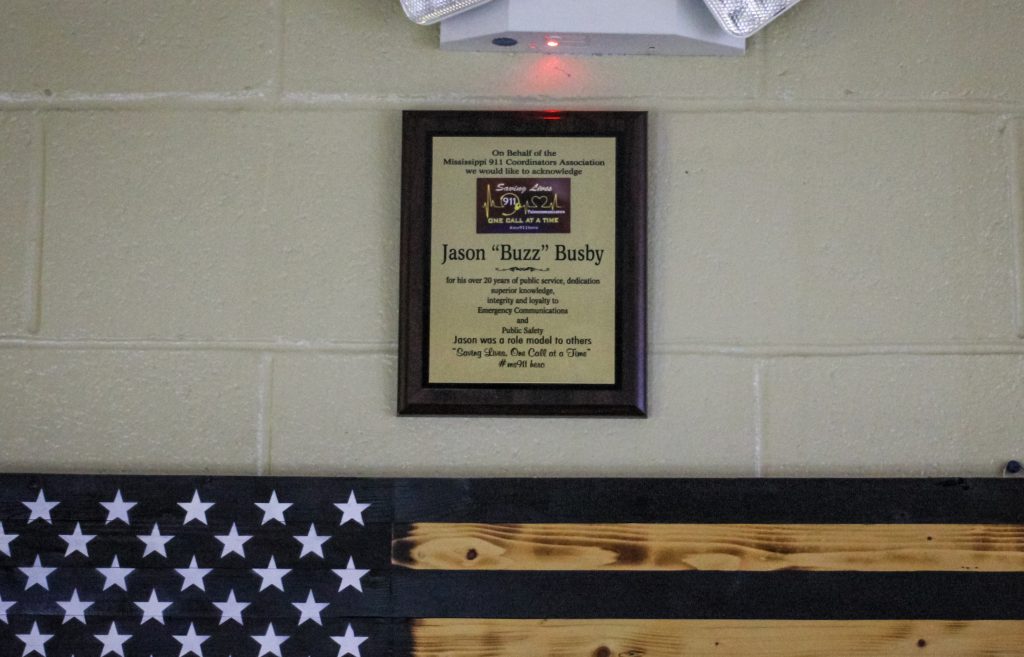County News
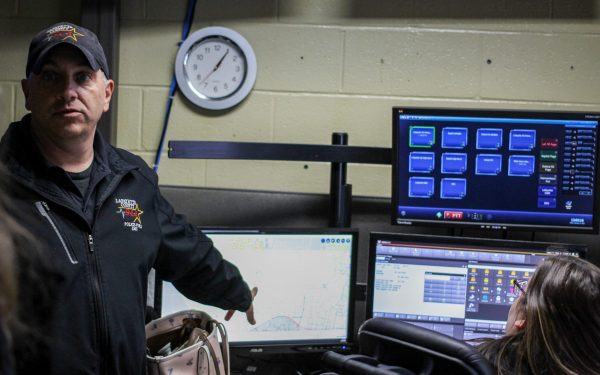
Paul Lytle fell into working at the 911 Dispatch Center back in 2012.
His sister, who worked with the Oxford Police Department, had convinced him that he’d love it. “It’s the nerve center of the county,” she said. He hadn’t understood what she meant at the time, but now, there’s no doubt about it.
The narrow windowless room that makes up the 911 Dispatch Center is lit by computer monitors—five for each of the three dispatchers on call—displaying everything from incoming calls and county maps to the location of on-duty deputies and warrant history.
Phones and computers sound intermittently, a mixture of calls for help from residents and reports from first responders. If there weren’t security cameras showing the front entrance of the building, you wouldn’t know if it was day or night.
Lytle, now the Lafayette County Emergency E-911 director, leads the dispatchers as they seamlessly answer phone calls, gather critical details and send first responders across the county.
“Our directive is fairly straightforward: we send help to the people who need it,” he says. “They call in and ask for it, whether it be a deputy, ambulance, fire department, EMR—we send it.”
An array of small wrecks, accidental calls and medical needs sprinkle through the 12-hour shift. It’s unusual to have this kind of quiet—a word the dispatchers refuse to say in case it provokes the opposite.
In 2022 alone, the 911 Dispatch Center saw 27,600 calls. That number grows by about 1,000 a year. Some days, the calls never stop coming. After shifts like that, Lytle says, the phones ring in his dreams. In his head, he repeats “10-4, 10-4” over and over. On this day, though, there’s time to breathe.
Training for the Call
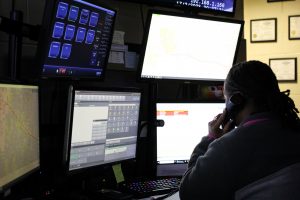
Ashley Thompson, a dispatcher trainee, sits at one of the computers. With the assistance of her team, she has begun taking 911 calls. “I have some good trainers,” says Thompson. “It’s a lot to take in, though. It’s really a mind thing.”
“It can be intimidating when you start,” Lytle admits. “You have 50 people listening to your voice live.”
In addition to a 40-hour basic class, Thompson takes a 40-hour Emergency Medical Dispatcher class, which qualifies her to give life-saving medical help over the phone. There’s a National Crime Information Center certification and a CPR class she has to take. The state gives her a year to get fully certified.
Like her other team members, Thompson will go on ride-alongs with first responders as part of her training. While it’s no longer required by the state, it can offer valuable insight for those taking calls.
“It gives you a different perspective,” says Robin Tidwell, who’s been a dispatcher since 2011. “It helps us as dispatchers understand the information other agencies need before they arrive on scene. You understand the ‘why’ of it.”
Training never ends for a dispatcher. Every three years, they must be re-certified. Continuing education ensures that they have up-to-date information that can save lives. They take classes on suicide intervention calls, domestic violence, legal liability, human trafficking and more.
Even with the extensive training, the first few months at the 911 Dispatch Center are tough for everyone. Dispatcher Taylor McNece’s first solo call was for a two-year-old whose trachea was bleeding. It was a shock. Her trainer noticed and took over the call.
“You learn the job through exposure,” says Lytle. “All the good and all the bad.”
A Well-Oiled Machine
A phone rings, and Thompson answers quickly. It’s a medical emergency. She asks questions in a calm voice, nodding to herself as she gets the answers.
“All right,” she tells the caller. “I’ll get them headed that way.”
At the same time, Tidwell calls the fire station, doling out the details of the call: the caller’s age, his medical history and the problem. She notes that the man has a pacemaker. She speaks clearly and efficiently, repeating the address twice.
Each call is taken by two dispatchers. There’s a good reason for this. While the first dispatcher speaks with the caller, asking crucial questions, the second moves quickly behind the scenes.
“The first person is finding out what they need to—If it’s a fire, is everyone out of the house? If it’s a fight, how many people? Are there drugs involved? Is everybody still there?—while the other is contacting Fire and EMS, getting them headed on their way,” Tidwell says. “The importance is getting there quickly. We can update them while they’re driving.”
In action, the teamwork demonstrates the deep trust between two dispatchers as they work together to get help to the scene swiftly and informed.
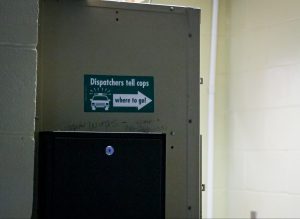 Not many people know that even outside of a phone call, dispatchers are investigating. For the more serious or violent calls, they check for clues online that might be helpful for the en route deputy. Critical information can sometimes be found on Facebook, Snapchat and Instagram.
Not many people know that even outside of a phone call, dispatchers are investigating. For the more serious or violent calls, they check for clues online that might be helpful for the en route deputy. Critical information can sometimes be found on Facebook, Snapchat and Instagram.
This investigating helps those making the calls as well as the first responders. When dispatchers check a caller’s 911 history, they can see what the past looks like at a residence, like whether there’s someone known to carry weapons or prone to running. “That way, when a deputy pulls up, they know what to expect,” says Tidwell.
“Our first job,” she continues, “is to take care of our first responders and be sure they go home at the end of a shift—whether it’s EMS, Fire, Law, it doesn’t matter. We’re the ones that send them to calls, so they’re ours. They got to go home.”
The Tough Calls
For 911 dispatchers, difficult calls are unavoidable. The hardest calls, Tidwells says, are the ones dispatchers have lived through before, on the other side.
“Even though they’re harder, you know what they need to hear because you’ve been them,” she says. “Sometimes you find yourself saying something, and you don’t know where it came from, but you know good and well that’s what you wish someone said to your family.”
Dispatchers are keenly aware of the limitations of phone calls. McNece calls it a blessing and a curse. “The only thing I can reference is hearing what’s going on,” she says. “The cries from mothers, from family members—those are my hardest. They’re begging for you to help, and you can’t do anything but be calming to them. What you really want to do is rush out there and hug them.”
A patient report hums through Tidwell’s computer. Everyone stops to listen to the update as they get details on a patient’s treatment, her blood pressure and how she’s responded since arriving in medical care.
After the Call
If a dispatcher isn’t well supported, the weight of calls can multiply, contributing to compassion fatigue and burnout. When people get to the point of burnout, they’re usually not the first to recognize it. That’s why it helps to have a supervisor like Lytle who keeps a close eye and will check in with them when he starts to see the signs.
“Having a person in charge who’s aware and willing to try to prevent it makes a big difference in the atmosphere here,” Tidwell says.
“It’s important for lots of reasons,” McNece adds. “Because at the end of the day, no one calls in here to have a good conversation with you. It’s always something bad.” Having dispatchers who can take the call and provide sympathy as they’re sending help is invaluable.
Location, Location, Location
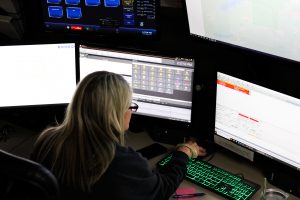
The dispatchers give their top advice for someone calling 911, and it’s very simple: Know where you’re located. Even if all the dispatchers get is an address, they can send help. Being able to relay your address early in the call means responders can be on the way as you’re providing the backstory.
As hard as it may be, staying calm and answering the dispatcher’s questions is paramount, too. “Help us help you,” Tidwell says. “Answer my questions so I can give the responders the best picture, especially if it’s a medical situation.”
Just because you’re still talking to a dispatcher doesn’t mean help isn’t on the way. It can take some time though, particularly if you’re at the far reaches of the county.
“Time slows down in an emergency for the caller,” Lytle says. “They can ask you why help hasn’t arrived, but you’ve only been speaking to them for 90 seconds.”
The Help Behind the Scenes
It’s a challenge to think of these calls as ending when a dispatcher hangs up the phone. They start a ripple, extending beyond when the first responders arrive on scene, past the event itself. For the dispatchers sitting at their computers, though, they rarely get to experience it.
There are special occasions, however, when they’re recognized. At a dentist appointment recently, Lytle was approached by a hygienist whose father had a medical emergency. McNece had taken the call and sent an ambulance. “She wanted to say ‘thank you,’” Lytle says, “which is so rare, because nobody usually knows who we are or where we are or what we do.”
“Our best way to help is to get help out there,” he says. “It’s a very rewarding job. I’m proud of what I do, proud of my employees and proud of what they accomplish. It’s not easy.”

